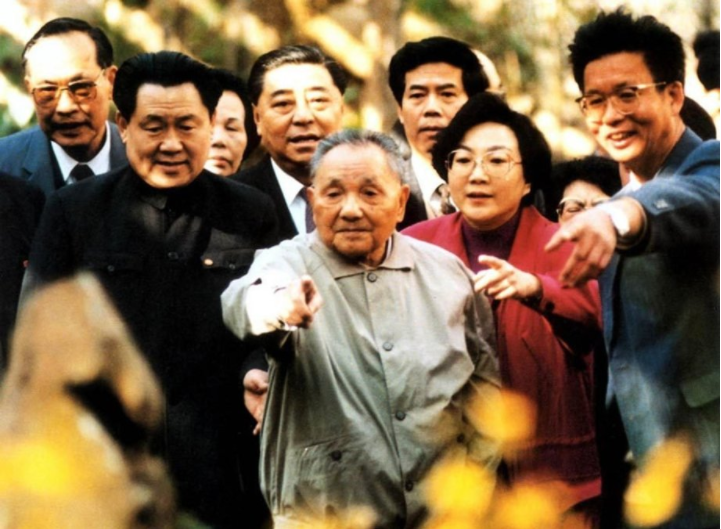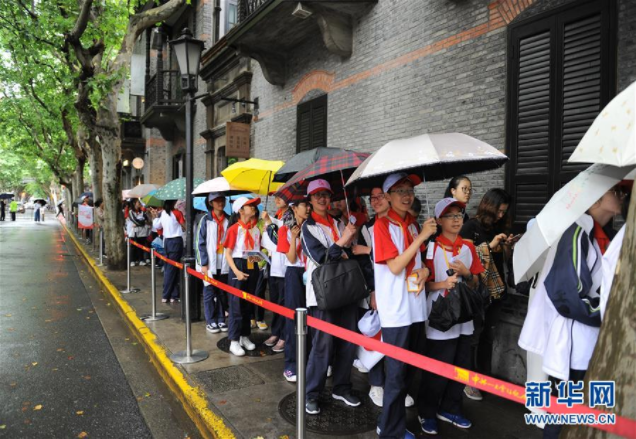Shanghai—This week, the Chinese Communist Party, the CCP, celebrates its centennial. Founded in 1921 by 12 men in a modest Shanghai townhouse, the party led a revolution that eventually established the People’s Republic in 1949. The rest is history. Is the party getting old at 100? Or is it still young? The future of China, and indeed that of the world, hinges on the answer to this question.
Whatever the qualms about the party and China’s political system, it is difficult to argue that the party has not been successful. In 1949, China was poor, partially colonized, and citizens had an average life expectancy of 41. Today, the mighty G-7 nations see it as a serious competitor. And the CCP did this on the scale of 1.4 billion people. This achievement is unmatched, but can the party keep doing it—and for how long? I would like to suggest that the party is now engaged in a significant project of renewal, which is placing this century-old organization at the vanguard of the nation’s youth. The world may be missing this important development.
Two lasting characteristics that have kept the party at the helm of the largest country in the world for so long are self-realization and self-reinvention. The first is the end, the second is the means to that end.

The party’s ultimate self-realization is centered on its original mission, in a contemporary Chinse term, chu xin. The party was founded with two overriding goals in the Chinese context: socialism and national renaissance, to rid China of the humiliating fate of foreign aggression and poverty it suffered in the modern era, build a prosperous, strong, and socialist society, and return the country to its rightful place among the world’s leading powers. Everything the party has done and will do in the future is to keep faith with this end.
The second characteristic, self-reinvention, is the party’s killer app. After all, the party has already engineered two historic reinventions and is in the process of a third.
The first was when the party transformed itself from a revolutionary fighting force into a governing institution in 1949. The second was Deng Xiaoping’s reforms that began in 1979, which changed China’s strictly closed and planned economy into today’s giant market economy deeply integrated with the global economy. These helped the party avoid the fate of the Soviet Union, a path many predicted with confidence that China would follow at the end of the Cold War.
In the past five to ten years, another reinvention has been taking place that presents the party with both opportunities and challenges. How the party executes this re-invention will have far-reaching implications.
In terms of China’s own development, the most significant event in this reinvention was the 19th Party Congress in 2017. It was then that China officially declared a paradigm shift, namely from a single-minded pursuit of economic development to the goal of achieving “balanced development” and “common prosperity.” In China’s political lexicon, this means redistribution.
This pivot did not come out of the blue. Rather, it was the culmination of economic and social developments many years in the making. The country’s headlong pursuit of economic growth in the 30-40 years since Deng’s reforms had achieved tremendous results. But new challenges also emerged—namely, political corruption, wealth inequality, and environmental degradation. Political corruption was tackled most ferociously starting after the 18th party congress five years before, but the battle continues. The party has begun in earnest to deal with the other two since 2017.
This reinvention coincides with significant social trends taking place in Chinese society, especially among young people. Those who were born post 1990 and 2000 (the so-called jiulinghou and linglinghou) are qualitatively different from the previous generations. Nearly 400 million strong, they form the backbone of China’s future. They grew up with a lot of education and in a China that has been increasingly prosperous and strong. Whereas my generation was primarily concerned with China being poor and, as a result, focused on market economics, jiulinghous and linglinghous see the main challenges to them and Chinese society as being rooted in inequality.
Significant signs show that Chinese young people’s perception of capital and market have turned negative, and their support for socialism and communism have increased markedly. For example, on Bilibili, China’s leading video social media for young people, content with communism, Marxism, capital, and labor became most popular in 2020, with increases greater than any other content. Even in the extraordinarily entrepreneurial tech sector, calls by young people for stopping excessive exploitations, both of lowly paid delivery workers and more highly compensated but overworked technical and professional workforces, are becoming louder.
In the previous reinvention, the party transformed itself from a planned economy manager to a governing coalition at the vanguard of development based on market economics. Now, by enshrining the goal of building a more equitable society in its political platform, the party is pivoting toward a reaffirmation of socialism and redistribution. The most dramatic action on the ground was the unprecedented drive to eliminate extreme poverty in the entire nation. The campaign began in 2012 and accelerated in 2015; it took eight years to lift the last 99 million people out of the bottom below the poverty line—a first in the entire Chinese history. To carry out this mission, millions of party cadres went to the frontlines of poverty in remote rural and mountainous regions under harsh conditions. By the most recent count, more than 1800 party members lost their lives on duty.
At the same time, the government is aggressively reining in monopolistic companies. The most famous example was the last-minute cancellation of the IPO of Alibaba’s Ant Financial. Stricter enforcement of anti-monopoly laws is now the norm. The goal is to protect public interests in general, and the interests of labor in particular, from abuses by large platform companies controlled by private capital. To use the party’s own language, the goal is to “contain the unchecked power of capital.”
This paradigm shift also presents significant challenges and risks. China’s young generations want to fix inequality but also want economic opportunities to continue to improve their standard of living. The latter is not possible without further sustained economic growth. State initiatives to redistribute, if misdirected, could choke off entrepreneurial incentives that are essential for growth. Can the party succeed in capturing this trend and turning it away from populist impulses and into actual policies that facilitate the building of an equitable and productive society?

Another paradigm shift has been occurring among Chinese youth; it is China’s perception of the world and its relations with it – especially the West. The Trump era showed the Chinese an America that was drastically different from the perception they had for many decades. Those who had looked up to the United States—saw America as China’s future—were blindsided. The new generation sees an America, and Europe for that matter, that is poorly governed, with inequality problems worse than China’s own, and with politics that seem dysfunctional and societies polarized and hostile from within.
The jiulinghous and linglinghous are much more confident about their country and more patriotic compared with previous generations. They respond naturally to the party’s call for greater confidence in China’s own path. Recent events helped consolidate this shift. One was the pandemic, where China’s swift containment stood in contrast to wave after wave in other countries. The other has been rising Western hostility toward China.
The Chinese public had long been accustomed to Western criticisms about their country on many issues, ranging from corruption to human rights. In fact, such criticisms often had a degree of sympathy or even support within the Chinese public, especially among commercial and intellectual elites. But with this current wave, the demonization of China by Western politicians and in the media has been widely perceived as extreme and as attempts to contain China’s further development.
Young people, in particular, see a portrayal of China in the West that doesn’t necessarily match their lives. And many are reacting with incredulity and anger. On the two primary issues that are drawing Western attacks on China, Xinjiang and Hong Kong, the vast majority of the Chinese public in general, and youth in particular, agree with Beijing. That’s why online boycotts are regularly called by young netizens against Western brands and personalities.
Indeed, Chinese youth are on course to be the strongest supporters within Chinese society of the party’s long held goal of pursuing China’s own development path. The latest data from the Edelman Trust Barometer show the Chinese public’s satisfaction with the government’s leadership has reached an astonishing 90 percent. A recent survey by University of California, San Diego show that support for the government jumped the most among younger respondents. In 2019, more than 80 percent of new party members were under the age of 35, totaling almost 1.9 million. Nearly 80 percent of college students express interest in joining the party.
All this perhaps comes as a surprise to Western readers. But with China’s young people so in synch with the raison d’etre—chu xin—of the party, the question is how the 100-year-old party can adapt to best serve (and lead) them. The party needs to steer the raw energy and aspirations of China’s young toward productive socialism and away from excessive populism, toward healthy patriotism, and away from narrow nationalism. If it can do this, it will deliver on the material and spiritual aspirations of China’s new generations and, as a result, stay in power for a long time to come. Success is not assured. But I wouldn’t bet against it.
Eric Li is vice president of China Forum, CISS, a venture capitalist and political scientist in Shanghai.
